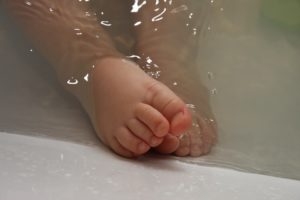It’s natural for first-time moms to have a thousand questions and doubts about giving their baby a bath, especially whether you can bathe a newborn at night or not. It’s completely normal to feel very concerned about what you can and can’t do with your baby. A newborn needs to be included in the family routine, which will adapt over time according to daily habits. For bath time to be a peaceful moment for both mom and dad, it is important that both feel confident and get answers to the most common questions that arise at this time. Can You Bathe a Newborn at Night? – How many baths does a newborn take per day?
What Are the Precautions for Bathing a Newborn at Night
The truth is that there is no contraindication for bathing a newborn at night; just a few precautions should be taken to not affect their health. The bath should be prepared, taking into account the room temperature, the water temperature, the climate, and the hygiene products you will use. It’s important to have everything easily accessible, especially if you’ll be bathing the baby alone, so set aside everything you’ll need before starting. A nighttime bath helps the baby relax and sleep better. So you can bathe your newborn at night, as there are no risks to this special time. 
Precautions During and After the Bath
Be attentive to the temperature of the water, which should be at thirty-seven degrees (37ºC). You can measure with a bathtub thermometer or check with your wrist; the important thing is that the water is not too cold or too hot1. Can you bathe a newborn at night even if it’s very cold? There are no restrictions, but the place where you bathe should be warmed up to around twenty-two to twenty-five degrees, so that the newborn feels comfortable and is not at risk. Some tricks can help at this time: after undressing the baby, wrap them in a soft cloth diaper and take them to the bathtub. Once in contact with the water, you can remove the diaper. This prevents the baby from feeling cold and helps them feel more secure. The hygiene products used must be suitable for babies to avoid skin irritation or stinging eyes. The choice of these products is up to the mom or according to each baby’s needs. After the bath, it’s important to dry their hair well and wrap the baby in a towel, to avoid drafts and prevent them from getting cold. The newborn’s bath shouldn’t be long.
How Many Baths Does a Newborn Take?
The question of how many baths a newborn can or should take is very common, but is there an ideal number? Remember, a newborn is clean, and every diaper change includes local hygiene. Pediatricians recommend changing diapers at least every three hours2. There is no limit to the number of baths, but one bath a day is ideal for a newborn. However, if needed—especially on hot days, or if the baby is very restless or irritated—an extra bath can help relax and soothe them. However, it is advisable to limit soap use on the second bath or more; using less will prevent your baby’s skin from drying out. Products that help your baby’s skin include moisturizers and baby oils, which are perfect for a massage after a bath. This both comforts and relaxes your little one, improving their sleep quality.
How to Bathe Your Baby
This moment can be quite stressful, especially for moms who have never done it before. But a mother’s instinct, together with some tips, helps a lot. Here’s a step-by-step on how to bathe a newborn3.
- To wash your baby’s hair and face, it’s recommended to wrap their body in a towel to keep them secure. Put your arm under their body and your hand on their head. With their body out of the tub and their head over the bathtub, wash the hair with a small amount of water, moving from the forehead to the back of the head.
- Be careful with the baby’s ears: it’s not advisable for water to get into the ears, to avoid possible infections. Be gentle, do not rub—just run your hand lightly over the face and hair.
- To wash your baby’s body, it’s important to hold them with your arm supporting their back and hand under their armpits so the head rests on your forearm.
- Turn the baby carefully to wash their back and bottom; support the baby’s chest and face with your arm, always holding their head with their chin resting on your hand.
- At the end of the bath, dry your baby with a very soft towel. Do not rub, and dry all skin folds thoroughly. Put on a diaper and dress your baby. As for moisturizer and diaper rash cream, that’s up to each mom.
The most important thing is to follow your maternal instinct—it never fails, and every mom has her own special way of caring for her baby. Make the most of this moment—it’s unique and should be relaxing for you both. See also: Newborn Bath – An Unforgettable Moment Photo: amyelizabethquinn











